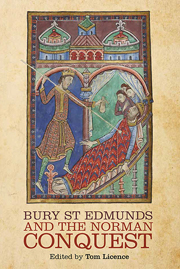Book contents
- Frontmatter
- Contents
- LIST OF ILLUSTRATIONS
- LIST OF MUSIC EXAMPLES
- LIST OF CONTRIBUTORS
- ACKNOWLEDGMENTS
- LIST OF ABBREVIATIONS
- Introduction
- 1 The Abbey and the Norman Conquest an Unusual Case?
- 2 Charters and Influences from Saint-Denis c. 1000–1070
- 3 The Abbey's Armoury of Charters
- 4 The Women of Bury St Edmunds
- 5 Baldwin's Church and the Effects of the Conquest
- 6 New Light on the Life and Work of Herman the Archdeacon
- 7 The Cult of St Edmund
- 8 St Edmund Between Liturgy and Hagiography
- 9 Books and their Use Across the Conquest
- 10 An Eleventh-Century Bury Medical Manuscript
- 11 Medicine at Bury in the Time of Abbot Baldwin
- 12 Medicine After Baldwin: The Evidence of BL, Royal 12. C. xxiv
- Index
Introduction
Published online by Cambridge University Press: 05 August 2014
- Frontmatter
- Contents
- LIST OF ILLUSTRATIONS
- LIST OF MUSIC EXAMPLES
- LIST OF CONTRIBUTORS
- ACKNOWLEDGMENTS
- LIST OF ABBREVIATIONS
- Introduction
- 1 The Abbey and the Norman Conquest an Unusual Case?
- 2 Charters and Influences from Saint-Denis c. 1000–1070
- 3 The Abbey's Armoury of Charters
- 4 The Women of Bury St Edmunds
- 5 Baldwin's Church and the Effects of the Conquest
- 6 New Light on the Life and Work of Herman the Archdeacon
- 7 The Cult of St Edmund
- 8 St Edmund Between Liturgy and Hagiography
- 9 Books and their Use Across the Conquest
- 10 An Eleventh-Century Bury Medical Manuscript
- 11 Medicine at Bury in the Time of Abbot Baldwin
- 12 Medicine After Baldwin: The Evidence of BL, Royal 12. C. xxiv
- Index
Summary
O Mars god of war, who curbs kingdoms by the sword,
who demands bloodied corpses of young men,
and men's blood poured out in mass slaughter,
what was your intent; how great your thirst for evil,
when in their midst you ordered savage troops to battle?
In the late 1060s, a cleric, possibly the bishop of Amiens, wrote a poem on the Norman Conquest. It represented William the Conqueror as a hero worthy of Troy, rightfully claiming a kingdom; but it also depicted him as a warrior revelling in gore, enthralled to the god Mars. The poet told of how venerable age and beautiful youth lay mingled in death on the battlefield and how William camped at Dover where the vanquished came to seek terms and kiss his feet, ‘just as flies … throng in swarms to sores full of blood’. Blood was impure in the eyes of the religious. A drop of blood was enough to desecrate a sanctuary. The taint of blood from intercourse rendered a priest unfit to say Mass, and to shed the blood of a Christian was to shed the blood of Christ. The mordant analogy of those sores full of blood – the Normans – marching upon Westminster, where their leader would be sacramentally anointed, should have troubled the conscience of the king the poet pretended to flatter. His subtext betrays horror and the expectation of penance. Comparable pressure came from the Norman bishops who imposed penance on William and his troops.
- Type
- Chapter
- Information
- Bury St Edmunds and the Norman Conquest , pp. 1 - 4Publisher: Boydell & BrewerPrint publication year: 2014



